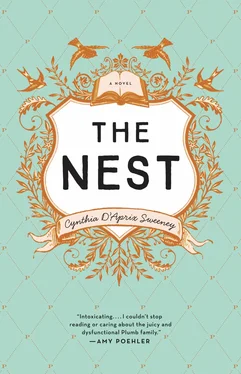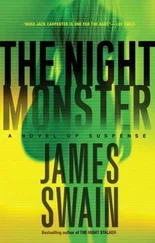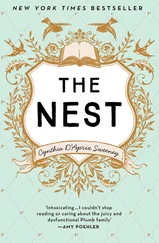“I wish I had the money sitting somewhere and could write you all a check,” Leo said. He placed his palms flat on the table and leaned forward, looking each one of them straight in the eye. He hadn’t run a company for all those years without learning the art of a quick recalculation, without learning how to work a table. He still mostly needed to bide time. “But I don’t. I’m going to need some time,” Leo continued.
“How much time?” Melody said, a little too quickly.
“I wish I had the answer to that,” Leo said, as if having that answer was his most fervent desire on earth. “But I promise you this: I am going to start working immediately — and hard — to rebuild. I already have some ideas. I’ve already started making some calls.”
“What’s the plan?” Jack said. He wanted specifics. “Is there a way for you to borrow the money you owe us? Pay us off and owe somebody else?”
“Very possibly,” Leo said, knowing that his chances of getting anyone to lend him money at the moment were nil. “A lot of things are possible.”
“Like what else?” Jack said.
Leo shook his head. “I don’t want to throw out a lot of what-if s and maybe s.”
“Do you think you might have the money — or at least some of it — when we were expecting to get it?” Melody asked.
“In March?” Leo said.
“February. My birthday’s in February,” Melody said, too panicky over how the conversation was going to be indignant.
“I’m March,” said Bea.
“Right.” Leo beat out a little rhythm on the table with his thumb and pinkie. He looked like he was doing a complex equation in his head. They all waited. “How about this?” he finally said. “Give me three months.”
“To pay us?” Jack said.
“No, but to have a plan. A solid plan. I don’t think I’m going to need three months, but you know how tough financing is these days.” He directed his last comment at Jack. “You’re a business owner.” Jack nodded in solemn agreement. Bea suppressed the urge to roll her eyes. Leo. He really was full of shit. “And figure in the holidays, when it’s tough to pin people down. I think I need three months to come up with options,” he said. “Ideally, more than one option that will have you seeing full payment as soon as possible. I’m not promising February, but I am promising that I’ll work as hard as I’ve ever worked on anything to try and make good.” He looked around the table again. “I’m asking you to trust me.”
Paul Underwood ran his literary magazine, Paper Fibres, from a small warren of offices up a worn flight of stairs in a slightly sagging building that stood in the shadow of the Manhattan Bridge. He’d bought the four-story brick front before the Dumbo section of Brooklyn became DUMBO, when the masses of migrating Manhattanites had been priced out of Brooklyn Heights and Cobble Hill but still had their hearts set on the aesthetically pristine, historically important, and relatively affordable brownstones of Park Slope or Fort Greene. He’d stumbled into the small wedge of a neighborhood one bright summer Saturday after walking across the Brooklyn Bridge. Leisurely heading north, he’d found himself wandering through the industrial blocks and admiring the streets of blue-gray Belgian bricks laid out in appealing patterns, threaded through with defunct trolley tracks. He’d noted with approval the absence of expensive clothing boutiques, high-priced coffee shops, restaurants with exposed brick and wood-burning ovens. Every fourth building seemed to be an auto body shop or some kind of appliance repair. He liked the vibe of the place; it reminded him of Soho back when Soho had energy and grit, a little theatrical menace. Down by the waterfront a sign indicated that the scrubby park populated with crack dealers and their customers was slated for expansion and renovation, and he noticed that the same developer had signs all over the neighborhood heralding the arrival of warehouse-to-condo conversions.
Standing on a corner of Plymouth Street that afternoon, in the waning days of the twentieth century, listening to the clank and rattle of truck beds as they rumbled over the approach to the Manhattan Bridge to his north, watching the sun illuminate the massive arches of the Brooklyn Bridge to the south, Paul Underwood saw his future: a For Sale placard on a seemingly abandoned corner building. At the top of the building’s reddish-brown façade he could make out the faded, white letters of a sign from the long-defunct business the dwelling once housed: PLYMOUTH PAPER FIBRES, INC. He took the sign as an omen. He bought the building the following week and started his literary journal, Paper Fibres, the following year.
Paul lived on the top floor of the building (two bedrooms, nicely renovated, meticulously furnished, spectacular views) directly above the Paper Fibres offices, which were crammed into the front half of the third floor. The back half of the third floor and the entire second floor housed two modest but increasingly lucrative rental apartments. At street level there was a lingerie store. La Rosa didn’t sell fancy lingerie, nothing lacy or push-up or see-through, but what Paul thought of as old-lady lingerie, matron underwear. Even the plastic torso mannequins in the windows looked uncomfortable, bound tightly with brassieres and girdles that resembled straitjackets with their rows of steel hooks, dangling elastic belts, and reinforced shoulder straps. Paul had no idea how they stayed in business, had never seen more than one customer in there at a time. He had his suspicions, but the rent check was on time every month so as far as he was concerned La Rosa could launder hosiery or money, or sell whatever they liked to the odd selection of male customers who usually left empty-handed.
Paul went to great pains to keep his home and work life separate. He never brought work “upstairs,” he never appeared in the Paper Fibres offices in what he thought of as civilian clothes, always dressing for the commute one quick flight down. Every morning he put on one of his exquisitely tailored suits and chose a bow tie from his vast collection. He believed the butterfly shape beneath his chin provided a necessary counterweight to his overly long face and inelegant hair, which was baby fine, mousy brown, and tended to stick out around his ears or at the crown.
“You can get away with colorful ties,” his ex-wife had told him, diplomatically referring to his rather unremarkable features — gray eyes that were more watery than striking, thin lips, a soft, almost putty like nose. Paul never minded his ordinary looks. They lent a valuable invisibility in certain situations; he overheard things he wasn’t supposed to hear, people confided in him, errantly judging him harmless. (His looks didn’t always work in his favor. There was the recent lunch, for example, which he’d scheduled with a young poet after their e-mail exchanges had turned flirtatious. That she’d been disappointed in his appearance versus the muscular wit of his correspondence had been abundantly clear by the look on her face. Well, he’d been surprised, too. Surprised to discover that she didn’t remotely resemble her author photo with its glossy hair, hooded eyes, and come-hither glistening lips.)
Paul valued routine and habit. He ate the same breakfast every day (a bowl of oatmeal and an apple) and then went for a morning walk along Fulton Ferry Landing. On weekdays he never deviated from his route, becoming an expert chronicler of the waterfront in all its seasonal mutations. Today the wind was fierce, battering the hearty souls brave enough to be outside; he leaned into it, pitching himself forward and wrapping his scarf more tightly around his neck. He loved the river, even during the grim New York winter, loved its steely gray shimmer and menacing whitecaps. He never tired of the view of the harbor; he always felt lucky to be exactly where he was, the place he’d chosen to belong.
Читать дальше
Конец ознакомительного отрывка
Купить книгу












